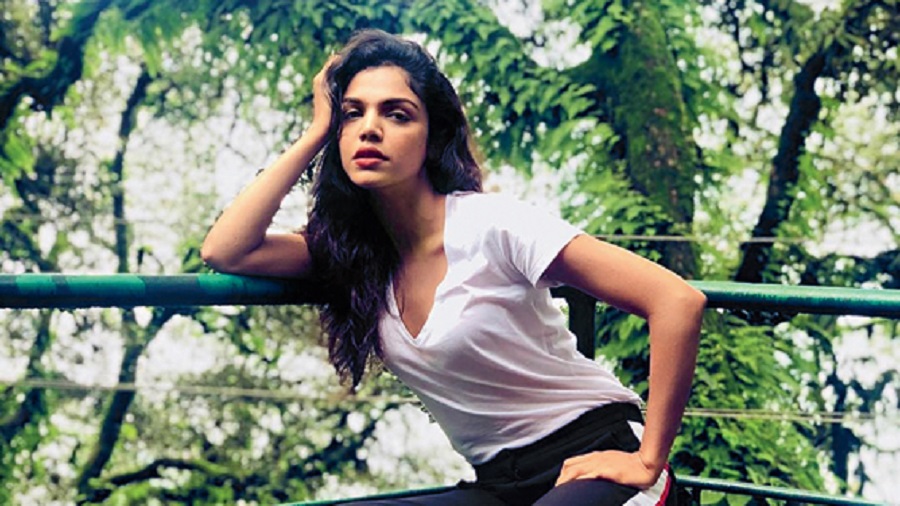Shriya Pilgaonkar, who debuted with Fan opposite Shah Rukh Khan and then went on to star in the ensemble of Mirzapur, has used the lockdown to film a web series called The Gone Game, that was shot entirely at home and is now streaming on Voot Select. The Telegraph chatted with Shriya on adapting to the new way of shoot and spending time with her actor parents Sachin and Supriya Pilgaonkar.
Despite the lockdown, it’s been quite a productive few months for you...
Every month of this lockdown has been a different experience for me. Since I had been travelling non-stop and shooting, the first two months were just about recuperating and of being with my family. In general, I am a homebody and it felt good being at home.
Luckily for me, even during the lockdown, some kind of work kept happening. I did a couple of shows of an online play called Lockdown Love. It was a new experience because it was my first time doing virtual theatre, with the audience watching it live on Zoom. What I really struggled with was the technology part of it. A little bit of advertising work also happened from home. I have nothing to complain... I have been able to work and also have time to do whatever I want to. I think when we look back at this time, we will realise how important it has been in our lives. It’s been opportunity to reassess things as well as have a fresh, new perspective.
I also shot The Gone Game completely from home during the lockdown. It was a great experience and gave me a chance to improvise as an actor and also hone my art and craft. I believe that art will always find a way to improvise and survive, no matter what the situation.
Unlike writing which can be done in isolation, acting is collaborative. How did it feel acting in isolation?
That’s true. But we did pull off The Gone Game, where the actors may have worked in isolation, but ultimately, it was team effort that brought it all together. Even as an actor, I can just record a monologue and put it up online. But yes as an actor, I am dependent on an entire mechanism to give me that one shot. When I ended up shooting for The Gone Game, I realised, more than ever, how each of these elements are instrumental... an actor is nothing without all of this. On this, I was doing my own costumes, hair and make-up, a little bit of the production.... It made me realise how collaborative this area of work is, and I missed the human connect.
But we managed... we did what we could. We have to look at the positives of the situation and find new ways to tell stories. That’s the only way we can adapt.
What happens when three actors are locked up in a house together for months, which has been the case with you and your parents Sachin and Supriya Pilgaonkar?
One thing I realised during these months is that in a normal world even when you are home, you are not really present. You just eat, sleep, update each other about your day. I am now cherishing every moment spent with my parents, and since it’s three artistes under one roof, the conversations are all so interesting, we are brainstorming on ideas, dad also writes a lot of Urdu poetry.... We talk about everything under the sun.
Luckily, they were also very supportive during my shoot. When you shoot at home, you need the family to be equally supportive. Even for them, it was a welcome change because some activity was happening at home. There were certain new things that they also learnt. Like I had to self-shoot and send some ad campaigns... and I had to do a lot of jugaad, like mounting the camera, get the lighting right...it’s interesting to see how the medium is also changing and adapting.
How involved are your parents in your career?
They are as involved as parents should be, but they absolutely not interfere. I know they are there for me and when I need to, I consult them for the decisions I make. But they never tell me what to do, though they empower me to understand how to make the correct choices. My parents have never discouraged me when I have made mistakes. They’ve emotionally equipped me very well in terms of how to work in and understand this industry. The values they have passed on to me and the conversations we have had have been less about acting and more about the human aspect of things. My privilege lies in having a support system like this and learning through all that they have done.
How do you look back at the career you’ve had so far?
I am a big believer of the fact that good work brings in more good work. Also, I realise that I may put in my best, but the returns you get may not always be in proportion to how much hard work you are putting in. Having said that, I am grateful for the opportunities I have had, including an international project like Beecham House with Gurinder Chadha or a French film that I did. Even though my first film (Fan) was with Shah Rukh Khan, it was Mirzapur that changed the momentum for me. Getting love for my acting happened with Mirzapur. For the first time, I came to be known as a character. No matter what else I do, people always go, ‘Sweety Gupta, Sweety Gupta!’ The challenge is now to give them something that’s as loved.










